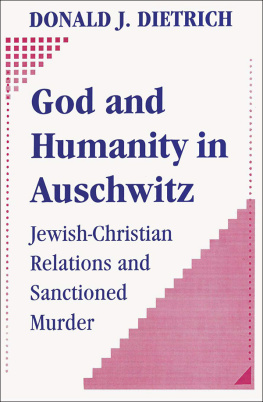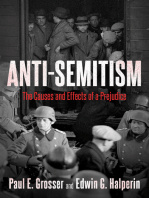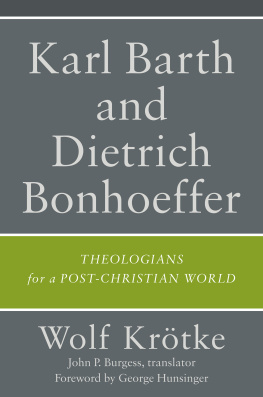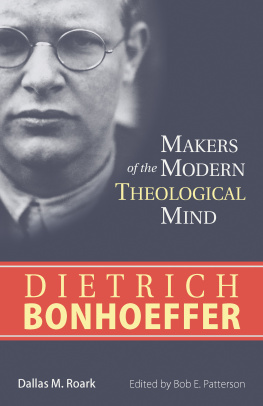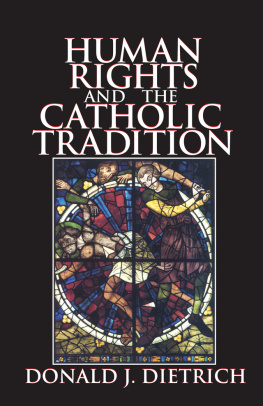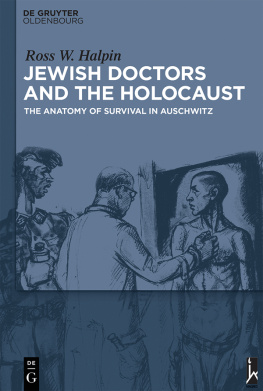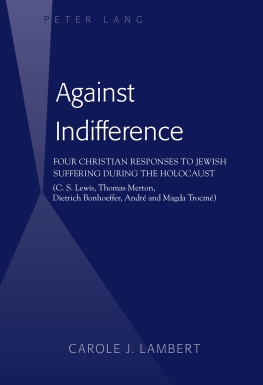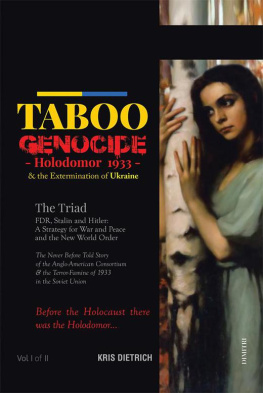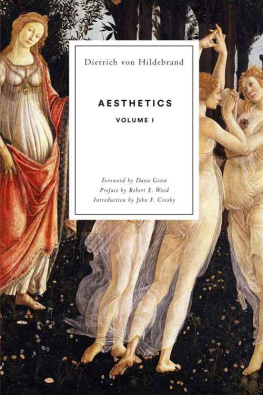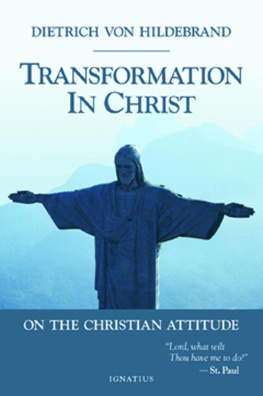God and Humanity in Auschwitz
Published 2017 by Routledge
Park Square, Milton Park, Abingdon, Oxon 0X14 4RN
711 Third Avenue, New York, NY 10017, USA
Routledge is an imprint of the Taylor & Francis Group, an informa business
All rights reserved. No part of this book may be reprinted or reproduced or utilised in any form or by any electronic, mechanical, or other means, now known or hereafter invented, including photocopying and recording, or in any information storage or retrieval system, without permission in writing from the publishers.
Notice:
Product or corporate names may be trademarks or registered trademarks, and are used only for identification and explanation without intent to infringe.
Library of Congress Catalog Number: 2008035547
Library of Congress Cataloging-in-Publication
Dietrich, Donald J., 1941-
God and humanity in Auschwitz : Jewish-Christian relations and sanctioned murder / Donald J. Dietrich.
p.cm.
Originally published: cl995.
Includes bibliographical references and index.
ISBN 978-1-4128-0858-3 (alk. paper)
1. Judaism-Relations-Christianity. 2. Christianity and other religions- Judaism. 3. Christianity and antisemitism. 4. Holocaust (Jewish theology) 5. Holocaust (Christian theology) I. Title.
BM535.D49 2008
261.2'6-dc22
2008035547
ISBN 13: 978-1-4128-0858-3 (pbk)
DONALD J. DIETRICH
God and
Humanity in
Auschwitz
Jewish-Christian
Relations and
Sanctioned
Murder
To Tom, Sue, Emily, Sara, and Elizabeth
This work is a product of two decades of teaching courses on the Holocaust and of reflecting on the tragic behavior of those Christian men and women who helped develop the antisemitic tradition in our culture. My own thoughts on the religious and cultural antisemitism that became institutionalized have been stimulated, broadened, and refined by the undergraduates and graduates in my lecture courses and seminars. Papers given at conferences have elicited comments from colleagues who have thoughtfully directed my attention to the pertinent questions posed by the Christian responsibility for this policy of sanctioned murder. Interactions with varied Jewish-Christian study groups in the United States and Europe as well as with Facing History and Ourselves, a Boston-based organization devoted to introducing Holocaust educational materials into our schools, has continuously sensitized me to the historical development of the deeply rooted antisemitism in our society.
Two men, however, have especially supported my scholarly work throughout these years. Irving Louis Horowitz, Hannah Arendt, distinguished professor of sociology at Rutgers University, and Otto P. Pflanze, now retired but formerly editor of the American HistoricalReview as well as my Doktorvater, have contributed to the scholarly dimension of my career. I would also be remiss if I did not thank my new colleagues at Boston College for their support as I made my transition from the University of Wisconsin-Stevens Point to my new academic home in Chestnut Hill. Several faculty research grants from Boston College have made the research and writing of this work possible. Additionally, the Bernard A. Stotsky/George and Bess Stotsky Endowed Research Fund has helped support my research and promises continued financing of Holocaust studies in the Department of Theology at Boston College. I would like to thank Stephen Cannella, a student at Boston College, for his work on organizing the details, which made the manuscript complete. Finally, I would like to express my appreciation to Susan Sweetser, my secretary, who managed to find time among all of our projects to type and correct several drafts. Without her, this book would not have been possible. Naturally, I acknowledge any errors in this work as my own.
Contents
Implemented as a political and racial policy and nurtured by an antisemitic cultural paradigm, the Holocaust emerged as a systematized program of cruelty and destruction that has hermeneutically informed post-1945 theological reflection and social science research. This tragic horror, perpetrated in a supposedly Christian civilization, has given rise to a critical and unrelenting inquiry into historical as well as contemporary Jewish-Christian relations, into the political and psychological nature and behavior of individuals and groups, and into the meaning of the roles that have been assigned to all of us in society. For some, the evil embodied in this unprecedented tragedy is incomprehensible because it poses theodicy-related questions, which they feel cannot be resolved. In general, however, we assume that we can comprehend our world. We may not like to think that as rational beings we have freely committed such carnage or created an environment within which such a tragedy could unfold, because our past actions can have very real implications for our future. But most of us understand that the Holocaust was intentionally implemented as a policy, and we have spent decades trying to understand the why and the how. Comprehension of the tragedy, of course, would seem to imply that methods of preventing future disasters have to be found. Normative standards would have to be institutionalized and theological systems reconfigured. Ultimately, when faced with such dissonance as good Christians exterminating Jews or creating an environment that permitted the Shoah, we have increasingly been finding that we can no longer manipulate information, emotions, and attitudes to compel theological consistency. Only by revealing the roots of and comprehending modern genocidal evil can there even be a possibility of shaping the future so that sanctioned murder will not happen again. The Holocaust offers us an example, upon which we can reflect, so that we can seek ways to avoid further genocide and incidents of sanctioned murder.
The religious and antisemitic roots of our civilization can be found embedded in Christianity from its very inception and have been consistently reinforced thereafter by the political, social, and cultural infrastructure that has supported European civilization. Scholars from varied theological traditions, therefore, have probed and analyzed the very essence of historical Jewish-Christian relations with an intent to see if Christianity by its very nature is antisemitic. Such a scholarly enterprise is necessary since the sociopolitical roots of and the psychological mechanisms supporting our civilization have matured in a religious and anti-Jewish context. Even in the modern era, this anti-Jewish bias has supported secularized ideologies resembling through terminology and imagery the historically Christian culture that was contemptuous of the Jewish people. Any solution that hopes to avoid such catastrophes as the Shoah in the future must go back to the roots of the religious commingling in the first century C.E., must respond to the theological axioms that evolved in Jewish-Christian relations, and must also explore the sociopolitical antisemitic paradigm that emerged during and after the Enlightenment as Europe adjusted to the industrial revolution. Given the research already published in a panoply of books and journals, the time has come to analyze systematically the scholarly efforts and their concomitant results, which have accumulated during the last twenty-five years, in order to suggest ways to reconfigure the values at the base of our society so that such disasters can be avoided in the future. The underlying premise in this work, therefore, is that to be human means to have the ability to shape the religious, social, and political conversations that converge as the human condition.

